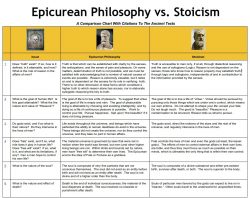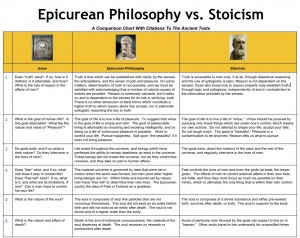Top Problematic Attitude and “Life Premise” Issues Made Worse By Stoicism and Cured by Epicurean Philosophy
With the assistance of input from the Facebook group, I have been working on a list of basic “attitude” or “life premise” divergences that separate Epicurean v Stoic views. I have made liberal use of “scare quotes” to reference controversies, and I refer my stoic friends to the chart at the end of the post for references. With that caveat, here is the list as it currently stands:
(1) Stoics taught belief in and acceptance of “fate”; Epicureans taught that fate does not exist and emphasized pro-active use of “free will” to work as diligently as possible to overcome obstacles.
(2) Stoics regarded the universe as created by god and/or divine in itself; Epicureans taught that the universe as a whole has existed eternally and is completely natural.
2A) Stoics taught that the current operation of the universe is saturated with supernaturalism and direct intervention of divinities; Epicureans taught that the current operation of the universe is completely natural and that any divinities which exist take no role in human affairs. (H/T to Matt Jackson)
(3) Stoics taught that the goal of life is “virtue;” Epicurean taught the goal of life was “pleasurable living.”
(4) Stoics emphasized dialectical logic and reason as the basis for determining “truth”; Epicureans emphasized reliance on a triad of (A) five senses, (B) anticipations, and (C) pain and pleasure as the basis for determining “truth”
(5) Stoics regarded emotions in general with suspicion and pleasure in particular with disdain; Epicureans taught that the wise man will feel emotions more deeply than others and that pleasure in particular is to be embraced as the guide of life.
(6) Stoics taught that the soul is divine and exists is some form after death; Epicureans taught that the soul is completely natural and ceases to exist at death.
(7) Stoics considered “justice” to be something that is real and the same for all men at all times and all places (just like the other virtues). Epicureans taught that “justice” does not exist in absolute form and is only a relationship that exists at particular times and places deriving from the happiness of the people concerned.
(8) Stoics taught that life should not be considered a thing of value; Epicureans taught that life should not be deprecated; that life is desirable, and it is folly to wish one had never been born.
(9) Stoics emphasized aloofness and detachment from all desires; Epicureans taught that the desire for pleasure is good and indeed that pleasure is the guide of life.
10) Stoics embrace utopian political goals while disclaiming individual action in favor of aloofness; Epicurean disdain utopian political goals while embracing individual action when necessary and appropriate. (H/T to Jason Baker for core idea with modification by CA)
11) Stoics taught that all sins (faults) are equal, while the Epicureans taught that all sins are not of equal gravity. (H/T to Jason Baker)
Reference: Comparison Chart of Epicurean and Stoic Views


